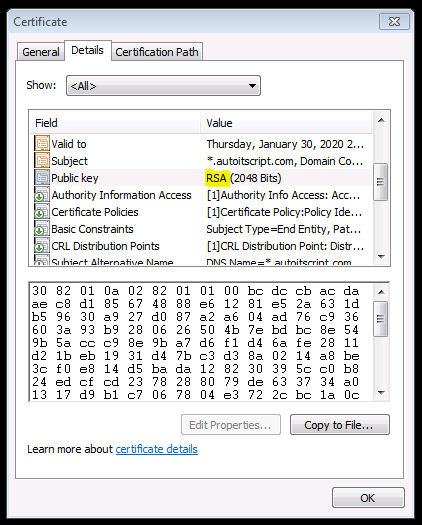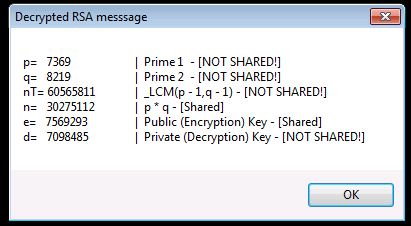Search the Community
Showing results for tags 'rsa'.
-
Version v2.4.0
1,718 downloads
Encryption / Decryption / Hashing / Signing Purpose Cryptography API: Next Generation (CNG) is Microsoft's long-term replacement for their CryptoAPI. Microsoft's CNG is designed to be extensible at many levels and cryptography agnostic in behavior. Although the Crypt.au3 UDF lib that is installed with AutoIt3 still works well, the advapi32.dll functions that it uses have been deprecated. In addition the Crypt.au3 UDF lib, as it is currently written, has a very limited ability to decrypt AES data that was not encrypted using Crypt.au3 functions. That is because Crypt.au3 functions do not allow you to specify an actual key or initialization vector (IV). It only lets you specify data to be used to derive a key and uses a static IV. This UDF was created to offer a replacement for the deprecated functions used by Crypt.au3. According to Microsoft, deprecated functions may be removed in future release. It was also created to allow more flexibility and functionality in encryption/decryption/hashing/signing and to expand the ability for users to implement cryptography in their scripts. Description This UDF implements some of Microsoft's Cryptography API: Next Generation (CNG) Win32 API functions. It implements functions to encrypt/decrypt text and files, generate hashes, derive keys using Password-Based Key Derivation Function 2 (PBKDF2), create and verify signatures, and has several cryptography-related helper functions. The UDF can implement any encryption/decryption algorithms and hashing algorithms that are supported by the installed cryptography providers on the PC in which it is running. Most, if not all, of the "magic number" values that you would commonly use to specify that desired algorithms, key bit lengths, and other magic number type values, are already defined as constants or enums in the UDF file. To flatten the learning curve, there is an example file that shows examples of all of the major functionality. This example file is not created to be an exhaustive set of how to implement each feature and parameter. It is designed to give you a template or guide to help you hit the ground running in terms of using the functions. I have tried to fully document the headers of all of the functions as well as the code within the functions themselves. As of v1.4.0, there is also a Help file that includes all of the functions, with examples. Current UDF Functions Algorithm-Specific Symmetric Encryption/Decryption Functions _CryptoNG_AES_CBC_EncryptData _CryptoNG_AES_CBC_DecryptData _CryptoNG_AES_CBC_EncryptFile _CryptoNG_AES_CBC_DecryptFile _CryptoNG_AES_ECB_EncryptData _CryptoNG_AES_ECB_DecryptData _CryptoNG_AES_GCM_EncryptData _CryptoNG_AES_GCM_DecryptData _CryptoNG_3DES_CBC_EncryptData _CryptoNG_3DES_CBC_DecryptData _CryptoNG_3DES_CBC_EncryptFile _CryptoNG_3DES_CBC_DecryptFile Generic Symmetric Encryption/Decryption Functions _CryptoNG_EncryptData _CryptoNG_DecryptData _CryptoNG_EncryptFile _CryptoNG_DecryptFile Hashing Functions _CryptoNG_HashData _CryptoNG_HashFile _CryptoNG_PBKDF2 Asymmetric (Public/Private Key) Cryptography Functions _CryptoNG_ECDSA_CreateKeyPair _CryptoNG_ECDSA_SignHash _CryptoNG_ECDSA_VerifySignature _CryptoNG_RSA_CreateKeyPair _CryptoNG_RSA_CreateKeyPairEx _CryptoNG_RSA_EncryptData _CryptoNG_RSA_DecryptData _CryptoNG_RSA_SignHash _CryptoNG_RSA_VerifySignature Misc / Helper Functions _CryptoNG_CryptBinaryToString _CryptoNG_CryptStringToBinary _CryptoNG_GenerateRandom _CryptoNG_EnumAlgorithms _CryptoNG_EnumRegisteredProviders _CryptoNG_EnumKeyStorageProviders _CryptoNG_LastErrorMessage _CryptoNG_Version Related Links Cryptography API: Next Generation - Main Page Cryptography API: Next Generation - Reference Cryptography API: Next Generation - Primitives Cryptography API: Next Generation - Cryptographic Algorithm Providers- 4 comments
-
- encryption
- decryption
-
(and 3 more)
Tagged with:
-
My RSA script, 128 bit and lower fast (for UDF attachment) Using : "RSATool2v17.exe" open and input (E) key and Keysize (Bits) "128", Generate "P, Q, D". Copy "P, Q, D" to my code ; Script Start - Add your code below here #include <String.au3> #include "BigNum.au3" Global $P, $Q, $SelectBase = 64 $base64 = "ABCDEFGHIJKLMNOPQRSTUVWXYZabcdefghijklmnopqrstuvwxyz0123456789+/" ;base64 ;Sexagesimal $base60_2 = "0123456789ABCDEFGHIJKLMNOPQRSTUVWXYZabcdefghijklmnopqrstuvwx" ;sexagesimal $base32 = "ABCDEFGHIJKLMNOPQRSTUVWXYZ234567" ;base32 $base24 = "0123456789ABCDEFGHJKLMNP" ;base24 $base16 = "0123456789ABCDEF" ;hex ;Duodecimal system or dozenal $base12 = "0123456789AB" ;duodecimal $base10 = "0123456789" ;base10 $base8 = "01234567" ;oct $base2 = "01" ;binary $P = _BigNum_Add($P, "18429553113751821539") $Q = _BigNum_Add($Q, "14963134653035728619") $n = _BigNum_Mul($P, $Q) $PHI = _BigNum_Mul(_BigNum_Sub($P, 1), _BigNum_Sub($Q, 1)) $e = _NumToDec("10001100011000110001", $base16) $D = "263455903565562556840568120179103558669" ConsoleWrite(@CRLF) ConsoleWrite("P: " & NumberBase($P) & @CRLF) ConsoleWrite("Q: " & NumberBase($Q) & @CRLF) ConsoleWrite("N: " & NumberBase($n) & @CRLF) ConsoleWrite("PHI: " & NumberBase($PHI) & @CRLF & @CRLF) ConsoleWrite("D: " & NumberBase($D) & @CRLF) ConsoleWrite("E: " & NumberBase($e) & @CRLF & @CRLF) $Message = _NumToDec(_StringToHex("TEST MESSAGE"), $base16) If StringLen($Message) > StringLen($n) Then Exit (1) $c = _BigNum_PowerMod($Message, $e, $n) $D = _BigNum_PowerMod($c, $D, $n) ConsoleWrite("C: " & NumberBase($c) & @CRLF) ConsoleWrite("D: " & _HexToString(_DecToNum($D, $base16)) & @CRLF) ConsoleWrite(@CRLF) ;==================================================================================== ;~ Func modpow($a, $b, $c) ;~ $res = 1 ;~ While $b > 0 ;~ ;/* Need long multiplication else this will overflow... */ ;~ If Mod(StringRight($b, 1), 2) Then ;If BitAND($b,1) Then ;~ $res = _BigNum_Mod(_BigNum_Mul($res, $a), $c) ;~ EndIf ;~ $b = BitShift($b, 1) ;~ $a = _BigNum_Mod(_BigNum_Mul($a, $a), $c) ; /* Same deal here */ ;~ WEnd ;~ Return $res ;~ EndFunc ;==>modpow Func NumberBase($num, $base = $SelectBase) If $base = 10 Then Return _DecToNum($num, $base10) ElseIf $base = 16 Then Return _DecToNum($num, $base16) ElseIf $base = 60 Then Return _DecToNum($num, $base60_2) ElseIf $base = 64 Then Return _DecToNum($num, $base64) EndIf Return $num EndFunc ;==>NumberBase Func _DecToNum($iDec, $Symbol) Local $Out, $ost $Symbol = StringSplit($Symbol, '') If @error Or $Symbol[0] < 2 Then Return SetError(1, 0, $iDec) Do $ost = _BigNum_Mod($iDec, $Symbol[0]) $iDec = _BigNum_Div(_BigNum_Sub($iDec, $ost), $Symbol[0]) $Out = $Symbol[$ost + 1] & $Out Until Not Number($iDec) Return SetError(0, $Symbol[0], $Out) EndFunc ;==>_DecToNum Func _NumToDec($num, $sSymbol, $casesense = 1) Local $i, $iPos, $Len, $n, $Out $Len = StringLen($sSymbol) If $Len < 2 Then Return SetError(1, 0, $num) $n = StringSplit($num, '') For $i = 1 To $n[0] $iPos = StringInStr($sSymbol, $n[$i], $casesense) If Not $iPos Then Return SetError(2, 0, $num) $Out = _BigNum_Add(_BigNum_Mul($iPos - 1, _BigNum_Pow($Len, $n[0] - $i)), $Out) Next Return SetError(0, $Len, $Out) EndFunc ;==>_NumToDec ; #FUNCTION# ;==================================================================================== ; ; Name...........: _BigNum_PowerMod ; Description ...: Modular Exponentiation Mod($n^$e, $k) ; Syntax.........: _BigNum_Pow($n, $e, $k) ; Parameters ....: $n - Positive StringNumber: Digits"0"..."9" ; $e - Positive StringNumber: Exponent ; $k - Positive StringNumber: Modulus ; Return values .: Success - Result Mod($n^$e, $k) ; Failure - -1, sets @error to 1 if $n is not a positive valid StringNumber ; -1, sets @error to 2 if $e is not a positive valid StringNumber ; -1, sets @error to 3 if $k is not a positive valid StringNumber ; Author ........: jchd ; Date ..........: 17.12.13 ; Remarks .......: Fractional exponents not allowed - use BigNum_n_root instead. ; ;=============================================================================================== Func _BigNum_PowerMod($n, $e, $k) If Not __BigNum_IsValid_3($n, $e, $k) Then Return SetError(1, 0, -1) Local $res = "1" While $e <> "0" If Mod(StringRight($e, 1), 2) Then $res = _BigNum_Mod(_BigNum_Mul($res, $n), $k) $e = _BigNum_Sub($e, "1") EndIf $n = _BigNum_Mod(_BigNum_Mul($n, $n), $k) $e = _BigNum_Div($e, "2") WEnd Return $res EndFunc ;==>_BigNum_PowerMod Func __BigNum_IsValid_3($sX, $sY, $sZ) If StringRegExp($sX, "[^0-9.-]") Or StringRegExp($sY, "[^0-9.-]") Or StringRegExp($sZ, "[^0-9.-]") Then Return False Return True EndFunc ;==>__BigNum_IsValid_3 RSA 2 (TEST NOW).zip
-
I found this article and enjoyed it so much I had play with some code since the numbers are small enough. https://thatsmaths.com/2016/08/11/a-toy-example-of-rsa-encryption/ Standard Encryption's vs RSA Encryption (Public Key Encryption) Fundamental Differences If you read that and couldn't immediately clarify the difference then let me blow your mind because its simple: STANDARD ENCRYPTION'S: ORIGINAL_DATA + Password(or KEY) = Encrypted DATA Then to decrypt -> Encrypted DATA + (SAME Password(or SAME KEY)) = ORIGINAL_DATA RSA: ORIGINAL_DATA + Password(or PUBLIC_KEY) = Encrypted DATA Then to decrypt -> Encrypted DATA + (DIFFERENT Password(or PRIVATE_KEY)) = ORIGINAL_DATA Are we all caught up? Did the colors help? I think they did That's crazy right? Don't answer. It is. And crazier its used EVERY TIME we make a secure connection to a server over the internet. But here's the craziest part to me that I recently got clarity on from the toy example and that is the simplicity of this very very very very important algorithm that has yet to be cracked (fingers crossed): Mod($vData ^ $key, $n) So ya. That's it. That's the magic algorithm. 3 values. Oh and $n is also a shared known value that will be in the certificate with the public key that your browser reads when it makes a connection: That's just mind blowing to me so couldn't resist getting something going in AUT. After playing with this code, I got a much better understanding of how its not just that algorithm that makes this whole thing possible. The numbers that we pick to form the public key and n are just as important and also how important it is to be random! Let me know if you have any problems. Enjoy! #include <array.au3> _Toy_RSA_Example() ;https://thatsmaths.com/2016/08/11/a-toy-example-of-rsa-encryption/ Func _Toy_RSA_Example() Local $p, $q, $n, $nT, $e, $d Local $aPublicKeys, $aCrypt, $sDecrypt, $sMsg ;Pick two random primes (they will be between 1000-10000) $p = _GetRandomPrime() $q = _GetRandomPrime() $sMsg = 'p= %i \t\t| Prime 1 - [NOT SHARED!]\nq= %i \t\t| Prime 2 - [NOT SHARED!]\n' ;Calculate lowest common multiple $nT = _LCM($p - 1, $q - 1) $sMsg &= 'nT= %i \t| _LCM(p - 1,q - 1) - [NOT SHARED!]\n' ;Calculate n. This is a shared number $n = $p * $q $sMsg &= 'n= %i \t| p * q - [Shared]\n' ;Get a small random list of possible public keys to pick from. Only searching for 100ms $aPublicKeys = _GetPublicKeys($nT) _ArrayDisplay($aPublicKeys, "Possible Public Keys Found") ;Pick a random public (encryption) key from array $e = $aPublicKeys[Random(1, $aPublicKeys[0], 1)] $sMsg &= 'e= %i \t| Public (Encryption) Key - [Shared]\n' ;Generate our private (decryption) key $d = _GetPrivateKey($e, $nT) $sMsg &= 'd= %i \t| Private (Decryption) Key - [NOT SHARED!]\n' ;format our msg (rsa details) to encrypt $sMsg = StringFormat($sMsg, $p, $q, $nT, $n, $e, $d) ;encrypt message $aCrypt = _RSA($sMsg, $e, $n) _ArrayDisplay($aCrypt, 'Encrypted RSA messsage') ;Decrypt array back $sDecrypt = _RSA($aCrypt, $d, $n) MsgBox(0, 'Decrypted RSA messsage', $sDecrypt) EndFunc ;==>_Toy_RSA_Example ;Function will perfrom Mod($v ^ $key, $n) on each char/element. ;Excepts Arrays or Strings. If input is array a string is returned and vice versa. Func _RSA($vDat, $key, $n) Local $bIsStr = IsString($vDat) If $bIsStr Then $vDat = StringToASCIIArray($vDat) For $i = 0 To UBound($vDat) - 1 $vDat[$i] = _Modular($vDat[$i], $key, $n) Next Return $bIsStr ? $vDat : StringFromASCIIArray($vDat) EndFunc ;==>_RSA ;algorithm is from the book "Discrete Mathematics and Its Applications 5th Edition" by Kenneth H. Rosen. Func _Modular($iBase, $iExp, $iMod) ; Mod($v ^ $key, $n) Local $iPower = Mod($iBase, $iMod) Local $x = 1 For $i = 0 To (4 * 8) - 1 If BitAND(0x00000001, BitShift($iExp, $i)) Then $x = Mod(($x * $iPower), $iMod) EndIf $iPower = Mod(($iPower * $iPower), $iMod) Next Return $x EndFunc ;==>_Modular ;Generate a "random" list of possible valid public keys to choose from based on $nT Func _GetPublicKeys($nT, $iMs = 100) Do Local $aKeys[10000] = [0], $iTime = TimerInit() Local $i = (Mod(@SEC, 2) ? Int($nT / 2) : Int($nT / 4)) ; randomize where we start Do If _IsPrime($i) And _IsCoPrime($i, $nT) Then $aKeys[0] += 1 $aKeys[$aKeys[0]] = $i EndIf $i += (Mod(@MSEC, 2) ? 1 : 100) ; randomize step size Until ($i >= ($nT - 1)) Or (TimerDiff($iTime) > $iMs) ReDim $aKeys[$aKeys[0] + 1] Until $aKeys[0] > 5 ; Ive seen 200+ returned sometimes and 0 on others. Make sure we have at least a few choices Return $aKeys EndFunc ;==>_GetPublicKeys ;https://www.geeksforgeeks.org/multiplicative-inverse-under-modulo-m/ - _ModInverse(a,m) Func _GetPrivateKey($a, $m) If ($m = 1) Then Return 0 ; Local $t, $q, $y = 0, $x = 1, $m0 = $m While ($a > 1) $q = Int($a / $m) ;q is quotient $t = $m ; $m = Mod($a, $m) ;m is remainder now, process same as Euclid's algo $a = $t ; $t = $y ; $y = $x - $q * $y ;Update y and x $x = $t ; WEnd Return $x < 0 ? $x + $m0 : $x EndFunc ;==>_GetPrivateKey ;Pick the next nearest prime from a random number (or number you cho0se) Func _GetRandomPrime($iStart = Default) Local $iPrime = ($iStart = Default ? Random(1000, 10000, 1) : $iStart) Do $iPrime += 1 Until _IsPrime($iPrime) Return $iPrime EndFunc ;==>_GetRandomPrime #Region Math Functions Func _IsPrime($n) For $i = 2 To (Int($n ^ 0.5) + 1) If Mod($n, $i) = 0 Then Return False Next Return True EndFunc ;==>_IsPrime Func _IsCoPrime($a, $b) Return _GCD($a, $b) = 1 EndFunc ;==>_IsCoPrime Func _GCD($iX, $iY) Local $iM While 1 $iM = Mod($iX, $iY) If $iM = 0 Then Return $iY $iX = $iY $iY = $iM WEnd EndFunc ;==>_GCD Func _LCM($iX, $iY) Return ($iX * $iY) / _GCD($iX, $iY) EndFunc ;==>_LCM #EndRegion Math Functions You should get a message box displaying the decrypted message with details of the values used: rsa.au3
- 3 replies
-
- rsa
- public key encryption
-
(and 1 more)
Tagged with:
-
so there is this post "Holographic Encryption with DARTIS" and the RSA came up. There is _RSA_crypt.7z from autoit-script.ru but the file is not available ( if anyone has the file, please get me a working link ) , so I don't know what or how it was done. My idea is to do the public key / private key (RSA) to exchange the hash/password ( call it what you will ), then, carry the rest of the communication with $CALG_AES_256 or the like. So it'd be doing a hybrid TCP/IP SSL, let's call it TCL 2.5 Anyhow, I need help for the simple reason that I'm quite clueless. CryptoAPI Cryptographic Service Providers may have a clue via the CryptoAPI ( but to me is all just words ). CryptEncrypt function say that: The Microsoft Enhanced Cryptographic Provider supports direct encryption with RSA public keys and decryption with RSA private keys. The encryption uses PKCS #1 padding. On decryption, this padding is verified. The length of plaintext data that can be encrypted with a call to CryptEncrypt with an RSA key is the length of the key modulus minus eleven bytes. The eleven bytes is the chosen minimum for PKCS #1 padding. The ciphertext is returned in little-endian format. so it should be possible from server 2003 / XP onwards. Thank you all who dare to go at it
- 1 reply
-
- advapi32.dll
- rsa
-
(and 3 more)
Tagged with:
-
Anybody knows how I can apply Public-Private Key encryption? I found several threads but they are all outdated Any ideas? I don't think it is included in advapi32 either, which is used by AutoIt atm










